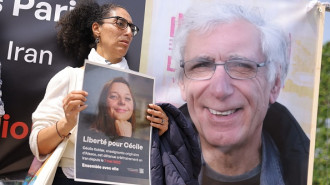Pompeo's visit to Lebanon aimed at ramping up pressure on Hizballah
US Secretary of State Mike Pompeo will land in Lebanon on Friday, where he hopes to step up pressure on Iran and Tehran's powerful local ally, Hizballah.
Hizballah has become one of the most powerful political forces in Lebanon, with its militia a vital force for Bashar al-Assad's regime in neighbouring Syria.
Lebanon's President Michel Aoun, along with the foreign minister and parliament speaker are considered allies of Hibzallah, while the US' Lebanese allies are also sensitive to the delicate power structure in the country.
Pompeo's Middle East tour is partly aimed to ramp up pressure on Iran, a strategy warmly welcomed in Israel, where the secretary of state visited on Thursday.
"We'll spend a lot of time talking with the Lebanese government about how we can help them disconnect from the threat that Iran and Hizballah present to them," Pompeo told reporters earlier this week.
"Hizballah is a terrorist organisation. You ask how tough I am going to be? It is a terrorist organisation. Period. Full stop."
Hizballah's militia is considered stronger than the Lebanese military and armed with an arsenal of tens of thousands of rockets and missiles.
It has also been hugely influential in Bashar al-Assad's fight-back against rebels in Syria.
Politically, Hizballah has more power in the Lebanese parliament and government than ever before. This has alarmed the US with Ambassador Elizabeth Richard expressing her concern over Hizballah's growing role in Lebanese government.
Pompeo has also said that he will make it clear to Lebanon's president that the US will not accept Hizballah's further expansion.
"We're going to be very clear about how America sees Hezbollah and our expectations about how Lebanon's success depends on the Lebanese people demand(ing) that a terrorist organisation not be in control of their government and not drive policies and create risk for their country as well," he said in Jerusalem.
|
|
Pompeo's visit to Lebanon comes after his first leg to Kuwait, where he sought to find a resolution to the Gulf crisis that has hit the region.
A Saudi-led blockade on Qatar is approaching its second year, while there are few signs of a solution to the crisis, despite the efforts of Kuwait to end the impasse.
"We hope the plan will take into account the situation in the region and all the relevant parties," Sheikh Sabah al-Khaled al-Sabah said on Wednesday.
Pompeo will also likely to offer US mediation on a maritime border dispute between Lebanon and Israel, with Beirut planning to begin offshore oil and gas exploration later this year.
The state department's top diplomat is also making a highly controversial visit to Israel, where the country's Prime Minister Binyamin Netanyahu is allying with far-right parties in next month's election.
Pompeo's visit to Israel is viewed by some as a show of support for Netanyhu, who has ruled out a two-state solution with Palestinians.
A sign of Pompeo's closeness to the right-wing Israeli premier was a visit with him to Jerusalem's Western Wall - in territory occupied by Israel but viewed as Palestinian - something not done by a US secretary of state.
"The trip to the wall is something that I've been talking with PM Netanyahu about doing some time ago. It's our first chance to go there together," Pompeo told journalists before the visit on Thursday.
"I think it's important. I think it's symbolic that a senior American official go there with a PM of Israel," he added, calling it "a place that's important to many faiths."
Agencies contribited to this story.
![pompeo [getty] pompeo [getty]](/sites/default/files/styles/large_16_9/public/media/images/CA46FF57-BDCE-4FB1-BF29-A7F06604E7D3.jpg?h=d1cb525d&itok=cwV6cyNl)




 Follow the Middle East's top stories in English at The New Arab on Google News
Follow the Middle East's top stories in English at The New Arab on Google News

![The law could be enforced against teachers without prior notice [Getty]](/sites/default/files/styles/image_330x185/public/2178740715.jpeg?h=a5f2f23a&itok=xMdFOAIF)
